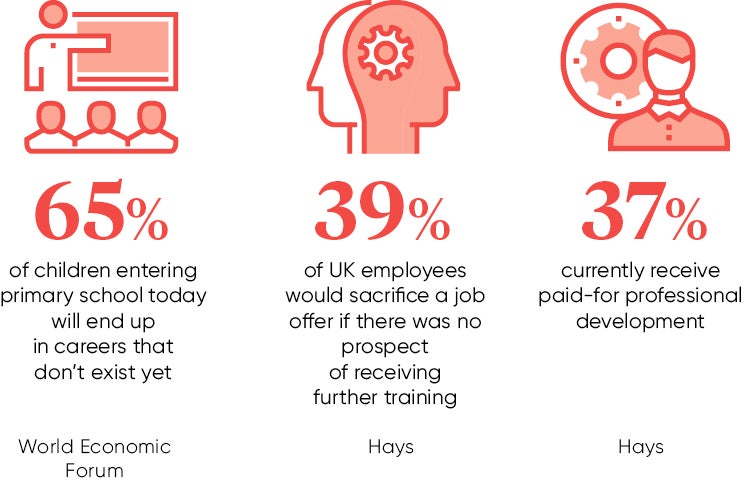The UK is in the middle of a skills crisis, with sectors ranging from engineering to hospitality and accounting to customer services, all reporting difficulty in attracting suitable staff, according to a recent survey by the Recruitment and Employment Confederation.
Against this backdrop, training and development has become more important than ever, both in developing the skills organisations require now or in the future, and in attracting and retaining talent. Research by recruitment firm Hays found 39 per cent of employees would be willing to sacrifice a job offer if there was no prospect of receiving further training, while 78 per cent described themselves as “ambitious”.
With the skills businesses require also changing – the World Economic Forum estimates 65 per cent of children today will end up in careers that don’t even exist yet – it’s also clear organisations need to update their approach to learning and development.
“Individuals and companies that succeed in the future will be those who adopt the philosophy of lifelong learning,” says Nigel Heap, managing director of Hays UK and Ireland. “Businesses that facilitate the resources, tools and time to support learning will not only have employees who are more engaged, but their business will be better placed to face challenges and remain innovative.”
Having senior leaders and managers back the concept is essential, says John Yates, group director at ILM, a City & Guilds Group business, and director of New Ventures. “At a very basic level, leaders are instrumental to rewarding and recognising efforts made to upskill, and they also need to develop their own skills and be seen to be doing so,” he says. “As a strategic priority, it must also be led from the very top and resourced accordingly.”
There are organisations attempting to develop such a culture, says Dr Simon Hayward, founder of leadership consultancy Cirrus and author of Connected Leadership, citing LEGO, Inditex and 3M as examples. “But they are too often the exception. The norm is for learning to be seen as separate to the day job, as something that is needed to get promoted or address performance issues.”
Individuals and companies that succeed in the future will be those who adopt the philosophy of lifelong learning
A continuous learning culture needs to be at the heart of an organisation rather than seen as an add-on, agrees Keely Woodley, partner and lead of Grant Thornton’s human capital practice. “John Lewis, for example, has a role dedicated to identifying and upskilling employees whose roles are likely to become obsolete in the future,” she says. Job rotations or short-term secondments can help give people exposure to new roles, she adds, while the apprenticeship levy can also help businesses extend training to all members of staff.
Sustainable energy firm InnoEnergy is another organisation that is looking to develop a culture of ongoing learning and development, including appointing Frank Gielen as its dedicated education director last year. “The format and content of our education programmes is driven by market research and the trends our thematic field leaders are observing across Europe,” he says. “Once we identify a long-term trend and understand the business needs, it’s our job to plan a programme around it.”
Universties
In addition to such internal initiatives, businesses are also starting to build closer links with schools and universities. “These partnerships could take many different shapes, from engaging in skills training days at local educational establishments to offering work experience opportunities to students during school holidays,” says Chris Moore, president of group operations at the Adecco Group UK and Ireland. Such initiatives offer the potential to build up skills in future employees, he adds, especially softer skills which are so often found lacking by employers.
These initiatives can also ensure schools teach the topics that are required by businesses, such as digital skills and cyber security. “Policymakers, the private sector, educational institutions and parents have a big role to play in encouraging learning opportunities among the next generation,” says Regina Moran, a vice president, and head of industry consulting and software solutions at Fujitsu.
“That’s why the news that the government will be launching new Tech levels, highlighting just how high technology now is on the national agenda, was welcome. It is no longer a nice to have; technology is absolutely core to the future of the UK economy, particularly as we move into the age of the internet of things and smart cities.”
Working with universities can also help businesses develop courses that will equip their staff with the skills they require in the future and universities themselves are beginning to see the potential of such tie-ups. Teesside University, for instance, is launching its Centre for Professional and Executive Development, designed to help firms cultivate a culture of lifelong learning.
“It will support organisational development, collectively and individually, and is there to disrupt mindsets, challenge thinking and support innovation,” says Professor Jane Turner, pro vice chancellor for enterprise and business engagement. “Universities are perfectly positioned to help organisations access and develop new talent, new ways of working, leading-edge research and product development.”

Using newer learning methods alongside more traditional elements can assist in developing a culture of lifelong learning, enabling employers and employees alike to access training as and when it is required.
“Through digital platforms, employers can ensure that their employees reach a certain level of knowledge and then employees might undertake face-to-face training to hone skills or ask practical questions,” says Stephen Somerville, director of business development at FutureLearn. His organisation has recently teamed up with Coventry University to make 50 degrees available through its online learning platform over the next five years, which can be accessed on a pay-as-you-go basis.
Yet for any continuous-learning initiative to succeed, it’s essential that employees buy into the concept, rather than seeing training as something that is done to them.
Universties






